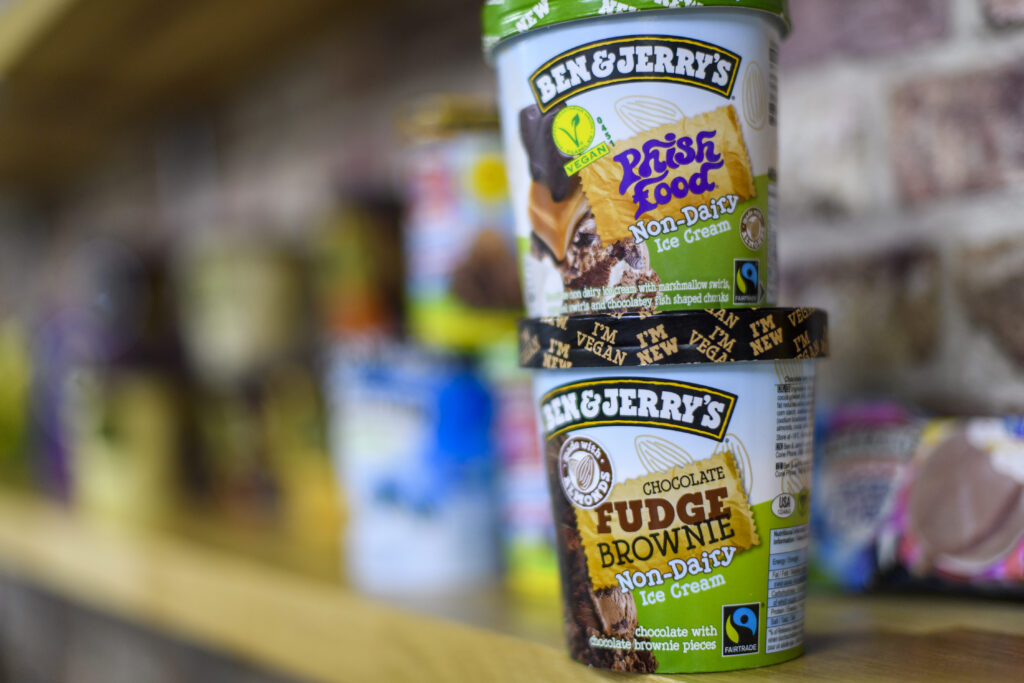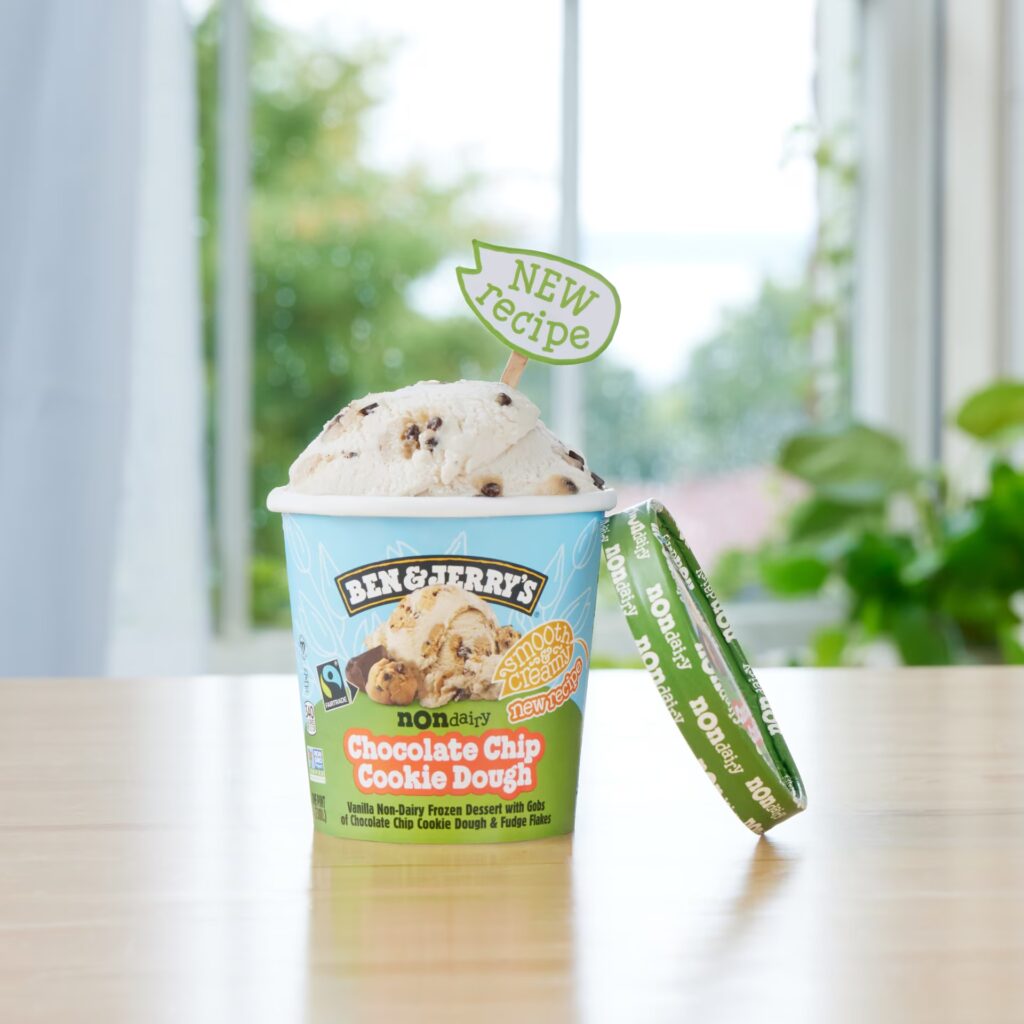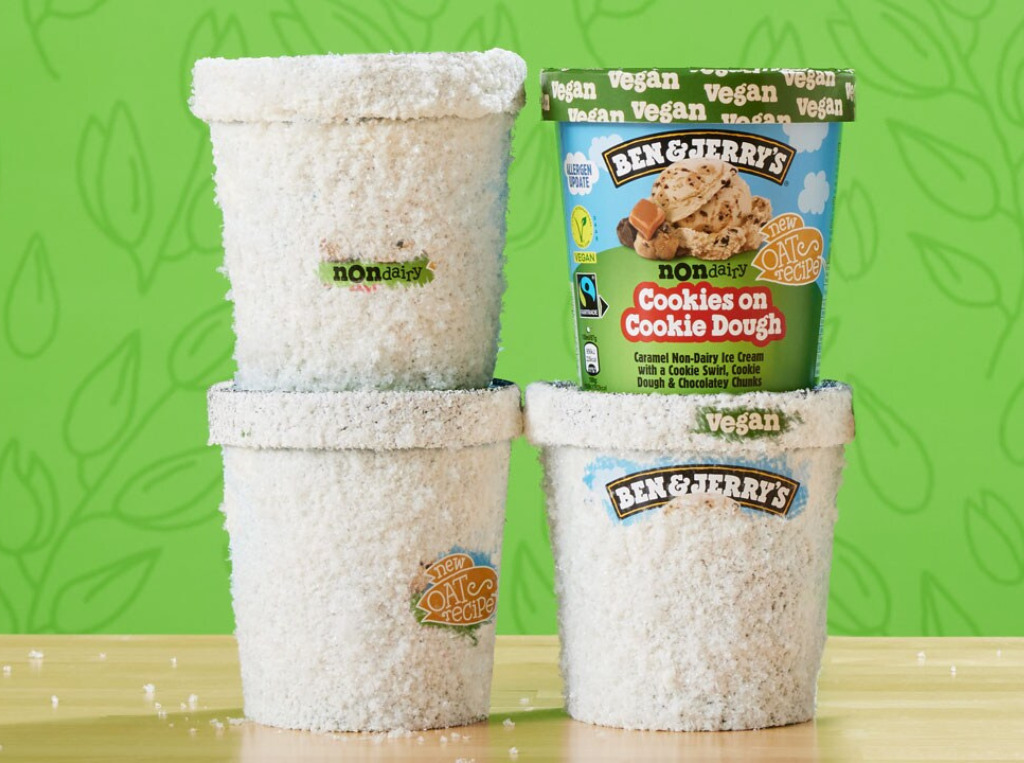Ben & Jerry’s to Reformulate Non-Dairy Ice Cream Recipes with Oat Milk For All 19 Flavours
5 Mins Read
Unilever-owned ice cream giant Ben & Jerry’s has announced that it will be reformulating its entire non-dairy range, switching from a base of almonds or sunflower seeds to oats. Starting with two trademark flavours that will be available this autumn, the rest of the lineup will debut in stores in spring 2024.
Ben & Jerry’s 19-strong vegan ice cream range currently contains a base of almonds and sunflower seeds, but the brand says the existing recipes change the overall flavour of the ice creams. The company sought to change its recipes two years ago, considering 10 different ingredient bases, including coconuts and rejigging the almond recipe.
Ultimately, the flavour team settled on an oat milk base, finding that it had the smoothest texture and most neutral flavour that would allow the core flavours of chocolate, caramel and vanilla to shine. The company adds that the change favours people with nut allergies – though using oats means that none of the frozen desserts are gluten-free either.
The reformulated versions of the Chocolate Chip Cookie Dough and Chocolate Fudge Brownie will be available this autumn in the US, while the 17 others will be launched worldwide in the spring. Ben & Jerry’s will also release a new flavour exclusive to the dairy-free ice cream range, specifically with the oat base in mind.
Ben & Jerry’s non-dairy history

Ben & Jerry’s, which boasts a 33% market share in the US non-dairy ice-cream sector, first launched its plant-based range in 2016 with Chunky Monkey, Chocolate Fudge Brownie, Coffee Caramel Fudge and Peanut Butter & Cookies flavours. This lineup has expanded over the years to include options like vegan Chocolate Chip Cookie Dough, Cherry Garcia and Phish Food.
In 2019, it launched edible cookie dough bites that were available in a vegan variant too, and a year later, it introduced a sunflower-butter-based line of ice creams in the US, whose current flavours include Milk and Cookies, Bananas Foster and Mint Chocolate Cookie.
With the new oat-based recipe, Craig Koskiniemi – one of Ben & Jerry’s ‘flavour gurus’ – told Food Dive that it could backfire with die-hard fans of its current dairy-free lineup, but stressed that oat won out in consumer taste tests. Additionally, non-dairy only makes up 7% of the company’s total packaged business, so the threat of sales crashes isn’t as huge.
In a statement, Colleen Rossell, another ‘flavour guru’, said: “With this new recipe, Ben & Jerry’s fans can expect more: more flavour, smoother texture, and more dessert euphoria with the same signature chunks and swirls. This new recipe is so good, it’s even loved by our most discerning dairy fans who are used to eating [dairy-based] ice cream.”
A crowded vegan ice-cream freezer

Plant-based products only account for a 2.6% share of the US ice cream market, with a household penetration rate of 11.8%. Despite the average American consuming 23 lbs of ice cream each year on average, dairy-free sales declined by 4% from 2021-22.
And in the UK – where Ben & Jerry’s leads the way in terms of overall tub and block sales – non-dairy products are said to make up 14% of new ice cream launches while accounting for less than 5% in take-home sales. Moreover, the British market saw a sales drop in vegan ice cream, with a 2% fall from 2021-22 (albeit a 14% hike from pandemic-hit 2020 levels).
It has led to a period of flux within the sector. Oat milk leader Oatly withdrew its entire ice cream range from the UK market earlier this year, citing increased competition and missed sales targets. The UK plant-based ice-cream aisle is getting increasingly congested, featuring brands including Häagen-Dazs, Magnum, Jude’s, Swedish Glace, Booja Booja, Northern Bloc and, of course, Ben & Jerry’s. And this is before you start factoring in supermarkets’ private-label brands.
It’s a similar scenario in the US, with So Delicious (owned by Danone), Häagen-Dazs, Wicked Kitchen, Van Leeuwen, Salt & Straw, Forager Project and Oatly – to name a few – combining with own-label brands to crowd the retail freezers.
Making a better product and exploring new tech

Speaking about Ben & Jerry’s recipe change to Food Dive, Koskiniemi explained: “We compared it to some of the other products on the market and we were finding that actually, there’s really room to improve what we had. It really stemmed from this internal view, knowing that we’re not satisfied with what we have. We know we can do better.”
Despite the increasing number of players in this space, it feels like the demand may be there – over half of consumers in a global survey said they’d be more willing to buy vegan ice cream if more options were readily available, according to Olam Food Ingredients.
“We can really help grow the nondairy category by improving the quality of our product,” said Koskiniemi. “We took our time to make sure that we were getting the best possible product for our non-dairy.”
The news also comes a year after Ben & Jerry’s parent company, Unilever, began working with European startups to explore precision fermentation technology, specifically pointing out challenges in the non-dairy ice cream segment. “We’ve got some things coming [in precision fermentation] in the next year or so,” said Unilever’s chief R&D officer for ice cream, Andrew Sztehlo, hinting that it would probably come from one of its big global brands, possibly a North American one.
California’s Perfect Day is a pioneer in this segment – with its former consumer-facing brands Brave Robot and Coolhaus using its precision fermentation-derived animal-free whey for its ice cream range.




